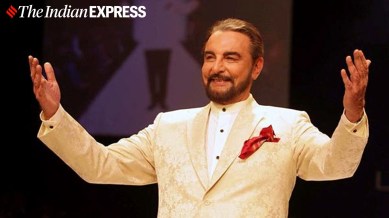📣 For more lifestyle news, click here to join our WhatsApp Channel and also follow us on Instagram
Kabir Bedi on open marriage with first wife Protima: ‘You do whatever you want, I will do what I want’; psychological challenges of such relationships
“And if our inclination is such that she wants to have an affair and I want to also have an affair, the best thing we can do is have an open marriage,” said Kabir Bedi

Actor Kabir Bedi, known for his illustrious career and equally eventful personal life, recently reflected on his open marriage with his first wife, Odissi dancer Protima Bedi.
Kabir and Protima shared a bond shaped by love, challenges, and unconventional decisions, including choosing an open relationship to sustain their marriage while parenting their two children, Pooja and Siddharth. “When you think about the past, you tend to have some regrets, everyone feels that and you think about what you could have done differently.,” Kabir said in an interview with Digital Commentary last year.
Kabir revealed that, at the time, they believed their children were the only bond holding them together. “At that time, we felt that if we want to be together, it is for the kids. And if our inclination is such that she wants to have an affair and I want to also have an affair, the best thing we can do is have an open marriage. You do whatever you want, and I will do what I want. We will stay together and parent our kids together. But ultimately, that didn’t work out. And it was a difficult thing to work,” he said.
Although their marriage eventually ended, Kabir shared that they remained amicable for their children. “Even though we separated, we divorced, I fulfilled all my responsibilities. I gave my house to her, and supported her too. We stayed friends all our lives because we had two kids, and we wanted the kids to know that even if the parents can’t stay together, they are still our parents,” he added.
This raises questions about the practicality of open relationships and their ability to sustain long-term commitments while navigating emotional and familial dynamics.
Psychological challenges that couples might face when navigating open relationships, especially when children are involved
Gurleen Baruah, existential psychotherapist at That Culture Thing, mentions, “One of the biggest issues is inconsistency in communication. Many couples assume they are openly discussing emotions and expectations, but in reality, there are gaps—unspoken insecurities, unaddressed jealousy, or avoidance of difficult conversations. Some individuals may struggle with passive-aggressive behaviours, withdrawal, or conflict avoidance, which can erode trust over time.”
Attachment styles play a crucial role, she adds. “Someone with a secure attachment is more likely to navigate an open relationship with stability, while those with anxious or avoidant tendencies may find it difficult to regulate emotions, leading to cycles of reassurance-seeking or distancing.”
When children are involved, Baruah notes that the dynamic becomes even more complex. “Children thrive on routine, stability, and consistency. While they may not fully grasp the nuances of consensual non-monogamy at a young age, what matters most is the environment of emotional security. When parents maintain open, age-appropriate conversations and model emotional well-being, children often develop an understanding of diverse relationship structures as they grow older.”
Factors that contribute to the success or failure of open relationships
Open relationships often fail despite mutual consent because emotional realities don’t always align with expectations. “While both partners may intellectually agree to non-monogamy, jealousy, insecurity, or emotional neglect can surface unexpectedly. Many struggle with passive-aggressiveness, avoidance, or resentment when difficult emotions aren’t openly addressed. Attachment styles also play a role,” states Baruah.
Successful open relationships require radical honesty, emotional security, and clear boundaries. Partners need to regularly check in about feelings, define what’s acceptable, and ensure the primary relationship remains strong. External pressures, such as social stigma or cultural norms favouring monogamy, can also add strain. Ultimately, Baruah adds that open relationships demand more “intentional communication and emotional maturity” than monogamous ones, and when these elements are missing, they often break down over time.
📣 For more lifestyle news, click here to join our WhatsApp Channel and also follow us on Instagram